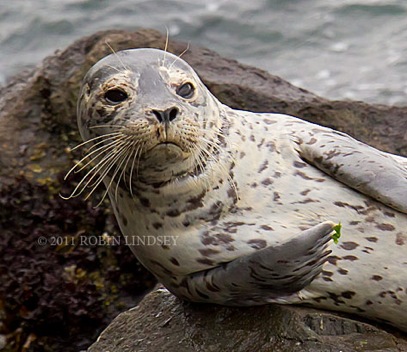Nov 2011
Spanky's thankful for rest
Nov/26/11 08:41 PM
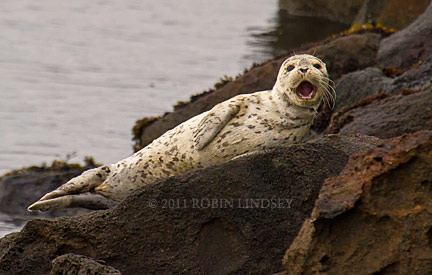
We hope our volunteers and readers had a wonderful holiday. Please know how thankful we are (and Spanky and his gang, too) for your support.
Cold volunteers enjoy seal pup siesta
Nov/21/11 10:00 PM
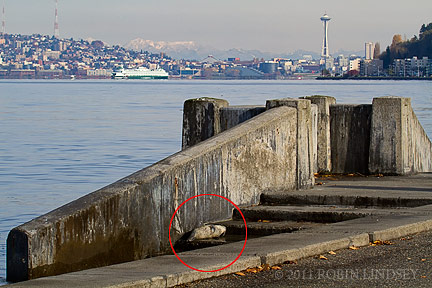
The seemingly healthy pup soon attracted a crowd and was nicknamed Sylvie by 5 year old Kayla. Many people were surprised that seal pups were still in the area, but we explained that as long as there was a food source of small bait fish, pups will continue to forage and rest here throughout the winter. An incoming tide whirled around Sylvie, convincing her to leave the beach and swim south along the seawall, seeking another haulout spot. Our volunteer spotted her flop-hopping up the cement steps along the Alki promenade across from Cactus restaurant. Surprised walkers gave her plenty of room to feel safe coming back ashore and she quickly settled in and fell asleep in the sun. It is quite a strange sight to see a seal pup sleeping on the
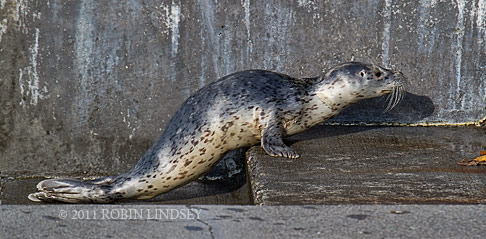
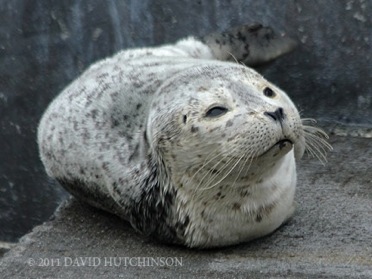
Harbor porpoise strands in Snohomish County
Nov/21/11 04:46 AM
Both our hotline and Edmonds Seal Sitters received calls about a “dolphin” washed up on a beach north of Edmonds. The animal turned out to be a harbor porpoise, likely a subadult in fairly good condition, with no obvious trauma or visible cause of death. Volunteers took photos, measurements, location information and secured the animal for pickup by a NOAA researcher for necropsy. Recovering the bodies of dead marine mammals is valuable to science and the environment. These necropsies allow us a window not only into the health of the population, but the health of the Sound as well.
Harbor porpoise, the smallest of the porpoise family at 5-5.5 feet long, are local to Puget Sound. They have a grey back and lighter to white belly. The dorsal, or top fin on their back, is a small triangle which differs from the more well-known dolphin with the classic curved dorsal fin. Washington’s largest and best known marine mammals, orcas, are actually the largest of the dolphin species with their distinctive tall, curved dorsal.
If you find a dead or live stranded dolphin or whale on the beach, do not touch or move it. Call the stranding network and keep people and dogs away for both their safety and the safety of the animal. To find your local stranding network and to learn more about strandings, click here.
Harbor porpoise, the smallest of the porpoise family at 5-5.5 feet long, are local to Puget Sound. They have a grey back and lighter to white belly. The dorsal, or top fin on their back, is a small triangle which differs from the more well-known dolphin with the classic curved dorsal fin. Washington’s largest and best known marine mammals, orcas, are actually the largest of the dolphin species with their distinctive tall, curved dorsal.
If you find a dead or live stranded dolphin or whale on the beach, do not touch or move it. Call the stranding network and keep people and dogs away for both their safety and the safety of the animal. To find your local stranding network and to learn more about strandings, click here.
Sea lion behavior rattles public
Nov/17/11 07:49 PM
The same morning, Sno-King’s responder also investigated a report of an “entangled” sea lion at the ferry terminal on the Seattle waterfront. There was no evidence of entanglement and the sea lion seemed to be resting and drifting close to shore as well.
Fall and winter, the sea lion population increases in Puget Sound and Elliott Bay as males return to our waters looking for food. Females as a rule do not migrate north, although there is one lone female who has resided in the Nisqually region since 2008, fondly nicknamed Nisqually Princess. Biologists are not sure why she has chosen South Puget Sound as her home.
No end in sight for West Seattle volunteers
Nov/15/11 08:38 PM
West Seattle’s crazy seal pup season continues full bore. Today we had 4 pups in different locations. This morning at 5:30 our responder found a pup in a perilous location. Thankfully, the pup returned to Elliott Bay about 7:30 am. We were on the alert since he had hauled out in the same location last night. We are pretty certain the pup was Umbreon, looking very chubby and alert. About 10 am we located Spanky at his usual haulout and taped off the area around him. Even before we could get that perimeter established, the hotline received a call about a pup at Lincoln Park. One of our stalwart volunteers headed for the Park, found the thin pup and began stretching yellow tape between pieces of driftwood and stakes. The pup snoozed til the end of the day. Seal Sitters also investigated a report of a pup on the rocks below Salty’s restaurant. We have yet to identify this pup who returned to Elliott Bay about 4:30 this afternoon after resting since early this morning. Finally, Umbreon hauled out again about 6pm, returning to forage about 8 pm.
What does this all mean? People are surprised that we still have pups hauling out, since “pupping season” is officially over in our area. However, weaned pups continue to need shoreline habitat to rest (as they will their entire lifetime) and they will come ashore near where they forage. It seems apparent that West Seattle has a pretty good food source of late to support a number pups. And it certainly helps that they have found refuge in a location where volunteers respond quickly to help them warm up, doze and recharge undisturbed.
Last year, seal pup Queen Latifah was still hauling out with regularity til late December. Seal Sitters is in the throes of a record breaking year for seal pups. So, volunteers, please keep using the calendar to sign up for shifts - we need your help!
What does this all mean? People are surprised that we still have pups hauling out, since “pupping season” is officially over in our area. However, weaned pups continue to need shoreline habitat to rest (as they will their entire lifetime) and they will come ashore near where they forage. It seems apparent that West Seattle has a pretty good food source of late to support a number pups. And it certainly helps that they have found refuge in a location where volunteers respond quickly to help them warm up, doze and recharge undisturbed.
Last year, seal pup Queen Latifah was still hauling out with regularity til late December. Seal Sitters is in the throes of a record breaking year for seal pups. So, volunteers, please keep using the calendar to sign up for shifts - we need your help!
Spanky's back in town
Nov/12/11 05:18 PM
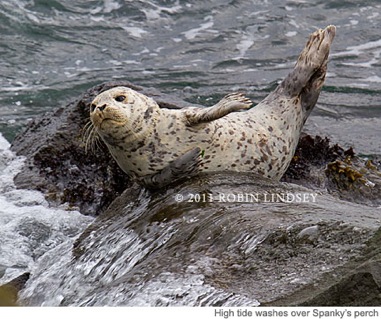
A surprising number of people were out jogging and walking, apparently trying to get their exercise in before the impending rainstorm. Soon thereafter, a cold rain began falling as volunteers arrived to do their “seal sitting” shifts and talk to passersby. We received a number of very nice comments today, thanking us for doing the work we do. That encouragement is always so appreciated, especially when dedicated volunteers are standing out in dreary and challenging weather conditions. We were concerned that we had not seen Spanky since last Friday. He fell deep into an inaccessible hole late Thursday afternoon (where he spent the night), but was rescued about noon the following day, examined for injuries and returned to the Sound. Needless to say, volunteers were thrilled to see him - even swirling winds and bitter rain could not dampen our spirits today. We often joke among ourselves that there should be a 12-step rehab program for volunteers hopelessly addicted to seal pups. Then we just shrug and laugh because the truth is, none of us want to be cured! Spanky returned to the water late in the afternoon at high tide. Thanks to everyone who watched over him.
Seal superhero rescues Spanky
Nov/04/11 06:22 PM
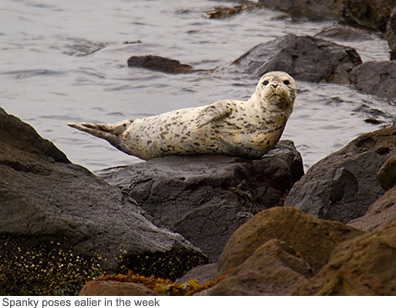
We turned to WDFW Marine Mammal Investigations’ biologist Dyanna Lambourn for her usual sage advice. She thought perhaps with a snare we could loop his back flippers and pull him up. So, that was the game plan put into action for this morning. Having spent a long and stressful night, Spanky was still trapped inside the hole at 6am, but was alert - a good sign. Read More...
Wiser pups choose safer haulouts
Nov/01/11 07:49 PM
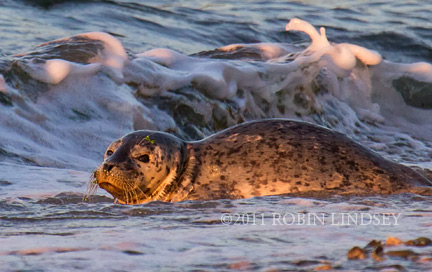
New pup Joy spent Friday in the rain on a private beach south of Alki, while another pup slept safely on a platform offshore. Homeowners kept a watchful eye on the pup until she returned to the Sound late in the afternoon. We have responded to reports of two additional pups hauling out on private beaches stretching as far south as Brace Point, where many homeowners have voiced concerns about off leash dogs.
